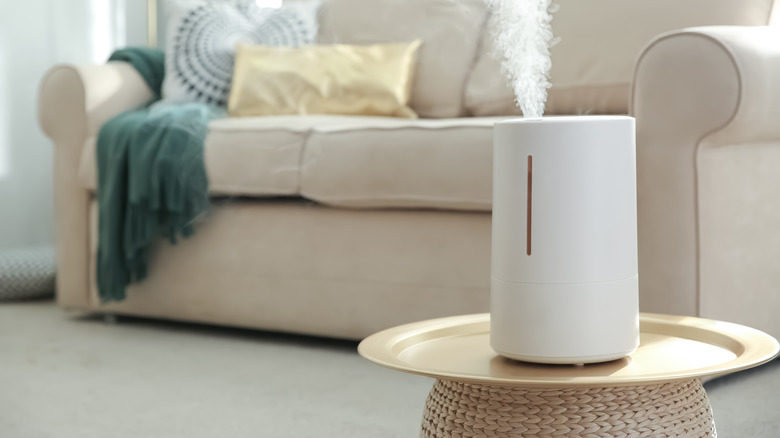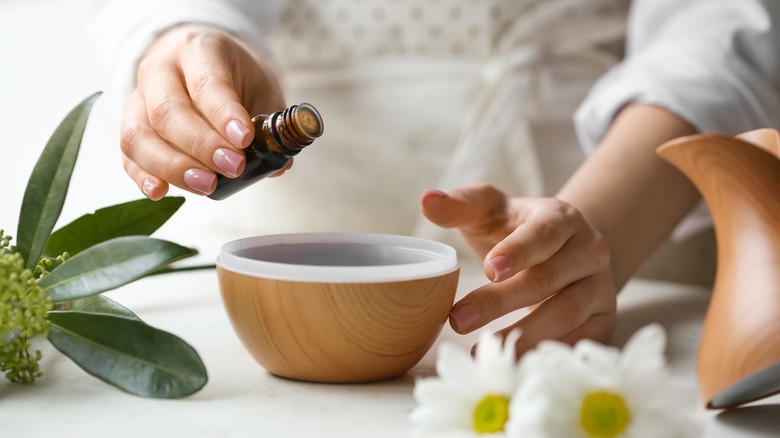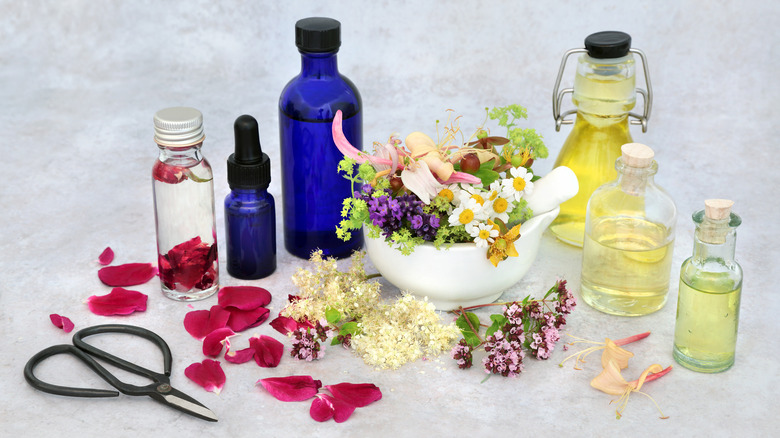Can You Put Essential Oils In Your Humidifier?
As the name implies, a humidifier is designed to increase moisture levels by dispersing water vapor into the air, so using one to release therapeutic essential oils would, at first glance, seem to be a perfect match. You can indeed put essential oils into your humidifier by adding a few drops into the water tank, but the proper question is, should you? An analysis of the pros and cons of different humidifiers and a comparison of those devices to oil diffusers tilts in the following direction: It is better to use a humidifier for the stated purpose of treating air with water vapor, and using a specialized oil diffuser to do just that — release oil particles into the air. However, one no longer has to choose one over the other. Aromatherapy-ready humidifiers with built-in oil diffusers are now being sold, reports Vinevida, and may be the answer to the question.
Per Device Support Hub, humidifiers descend from the porcelain pot equipped with a spout invented in 1783 for French hospitals. They ease breathing, ameliorate dry skin and eyes, and are beneficial to plants, among other plusses. Essential oils, the foundation of aromatherapy, are valued for their calming effect, ability to improve concentration, and for promoting relaxation. Several other benefits are also attributed to the oils: According to the International Federation of Aromatherapists, ancient Egyptians pioneered their use in medicine and religion more than 5,000 years ago. But here's what you need to know about combining these two.
Humidifier and oil diffuser combination
A hybrid device (as mentioned above) features a specialized compartment or tray in the humidifier in which to store oil. The machine draws water from a tank and disperses it, while the essential oils are also diffused into the air. The separate container allows the aromatics to evaporate without fouling other humidifier parts. According to Everlasting Comfort, an ultrasonic humidifier or oil diffuser is a great choice and should come with an ETL Safety Certification seal. The appliance can run safely for more than 50 hours before refilling and has a range of 500 square feet. For these devices, Geniani recommends water-soluble oils which are less dense and not as thick as typical ones and suggests using 5 drops of the aromatics to aerate every 50 or so feet of space.
If you insist on using a regular humidifier instead of the combined alternative, use only a cool mist with the oils. Renewed Health Oils advises against using too much of the essentials and ensuring to limit the hours of use so as not to oversaturate. Too large a space for the humidifier to effectively cover will result in a fragrance that is too diffuse. Besides, remember to clean your humidifier with vinegar and water regularly to prevent mold, and always read and defer to instructions to determine if your device and essential oils are compatible.
Drawbacks of using essential oils with a humidifier
There are no restrictions as to which oils can be used in a humidifier. However, using one to disperse essential oils may damage the appliance or, at the least, invalidate its manufacturer's warranty. Per Get Green Be Well, the large viscous particles of essential oils may gum up the filter or fan, clogging a humidifier that is meant only to produce an extremely fine mist. Highly resinous oils are most likely to cause such problems. Crane also warns that clogging a humidifier with essential oils can cause its tank to crack. Essential oils tend to be corrosive, especially citrus-based ones, so humidifiers made mostly of plastic will get damaged by them over time. In turn, heat from this device will dilute an essential oil, alter its fragrance, and possibly diminish its effectiveness.
According to Good Air Geeks, the appliance will disperse heavy and thick essential oils, which will settle on clothes and furniture. The residue is difficult to clean and unhygienic. Most humidifiers also lack timers and therefore run without interruption, so the user cannot regulate when the aromatic vapors are released. Healthline emphasizes that safely using essential oils requires careful handling. In addition, they can be toxic to pets (especially cats). Seniors, young children, and pregnant women should also avoid exposure to fumes, and those with thyroid issues should eschew aromatherapy.


